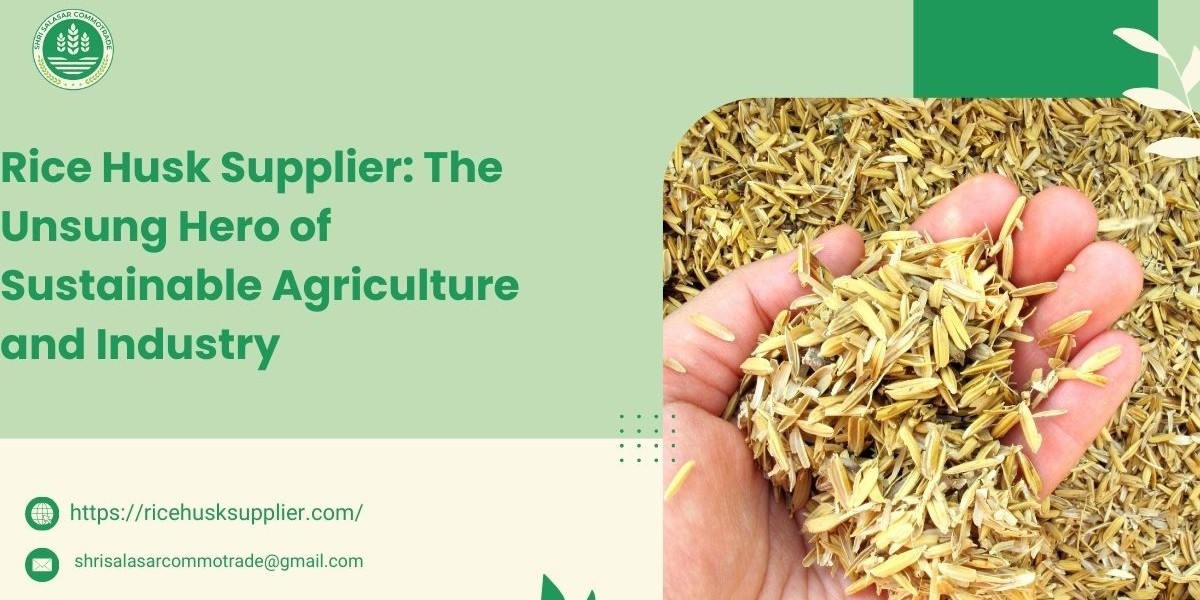In the world of agriculture and industry, rice husk is an often overlooked byproduct that has gained significant attention due to its numerous sustainable uses. Rice husks, also known as rice hulls, are the outer covering of rice grains. These tiny, fibrous structures are removed during the milling process and are typically discarded or burned. However, with the rise in demand for eco-friendly and renewable products, rice husk suppliers have stepped into the limelight by offering an array of valuable products made from rice husks. In this article, we will explore the role of rice husk suppliers, the benefits of rice husk, and the growing industries that depend on this humble agricultural byproduct.
What is Rice Husk?
Rice husk, or rice hull, is the hard protective covering of the rice grain. When rice is harvested, it is milled to remove the husk before being packaged for consumption. While rice husks may seem like mere waste, they are incredibly rich in cellulose, hemicellulose, and lignin, making them useful in a variety of industrial applications.
The Importance of Rice Husk Suppliers
Rice husk suppliers act as a bridge between agricultural production and industries that need sustainable raw materials. They gather rice husk from rice mills and farmers, process it, and then supply it to various sectors, including:
- Energy Generation
- Construction Materials
- Agriculture
- Textiles and Fabrics
- Food and Beverages
- Biomass Products
As the demand for sustainable resources increases, the role of rice husk suppliers has become increasingly important in meeting the needs of industries looking to reduce their environmental impact and enhance the value chain of agricultural byproducts.
Benefits of Rice Husk
Renewable Energy Source
Rice husks are an excellent source of biomass fuel. They are rich in energy and can be burned to generate heat and electricity, making them an ideal alternative to traditional fossil fuels.
- Efficient Energy Production: The high cellulose content in rice husks allows for efficient combustion, which results in higher energy yields compared to other organic materials.
- Low Emissions: When processed correctly, rice husks can be burned with low emissions, making them a cleaner and more sustainable option for energy generation.
Many rice husk suppliers provide rice husk pellets or briquettes, which are compacted forms of rice husks that can be used as a renewable fuel source in biomass power plants, industrial boilers, and heating systems. This use of rice husks in energy production significantly reduces reliance on fossil fuels and helps mitigate climate change.
Organic Fertilizer and Soil Enhancer
Rice husks are rich in nutrients and can be used as an organic fertilizer or soil conditioner. They contain silica, which is beneficial for plant growth, and can help improve soil structure.
- Improved Soil Aeration: Rice husks improve soil aeration and drainage by preventing soil compaction.
- Nutrient-Rich: The ash left from burned rice husks is also rich in potassium, phosphorus, and other essential nutrients, making it an excellent addition to soil.
For farmers, rice husk suppliers can provide processed husk products that help enhance soil health and promote sustainable farming practices. Rice husks also act as a natural mulch, helping retain moisture and suppress weed growth in gardens and agricultural fields.
Biodegradable Packaging Material
As the world moves toward reducing plastic waste, rice husks have emerged as a potential alternative in the packaging industry. Rice husk can be processed into biodegradable packaging materials, such as rice husk foam, which is a lightweight and environmentally friendly material.
- Eco-Friendly: Rice husk packaging is biodegradable and compostable, unlike plastic, which takes hundreds of years to decompose.
- Durable and Lightweight: Rice husk packaging materials are durable and lightweight, making them ideal for shipping and transportation.
Rice husk suppliers are playing a vital role in supplying this sustainable material to industries seeking greener alternatives for their packaging needs.
Rice Husk as a Construction Material
Rice husks have proven to be a valuable addition to the construction industry. They can be used in the production of rice husk ash, which is a byproduct of burning rice husks at high temperatures. This ash has several beneficial uses in construction, including:
- Concrete Production: Rice husk ash can be mixed with cement to produce high-strength, eco-friendly concrete.
- Insulation Material: Rice husk is a great insulating material that can be used in walls, roofs, and floors to improve energy efficiency in buildings.
Additionally, rice husks are used to make eco-friendly bricks and boards that are used in sustainable construction projects. As green building practices become more popular, the demand for rice husk-based materials continues to rise.
Rice Husk in the Textile Industry
Rice husks are now being used in the textile industry, particularly in the production of eco-friendly fabrics. Rice husk fibers are strong, lightweight, and durable, making them suitable for the production of textiles that are both comfortable and sustainable.
- Eco-Friendly Fabrics: Rice husk fibers are woven into sustainable fabrics for clothing, upholstery, and other textile applications.
- Natural Dye: Rice husks are sometimes used to produce natural dyes for fabrics, offering a chemical-free alternative to synthetic dyes.
This use of rice husk in textiles supports the growing demand for eco-friendly and sustainable fashion.
Rice Husk as Animal Feed
Rice husks, when processed correctly, can be used as animal feed. They are high in fiber and can be used as a supplement in the diets of livestock like cattle and poultry.
- Rich in Fiber: Rice husks provide essential dietary fiber, helping to promote digestion and overall health in animals.
- Affordable: Using rice husks as animal feed can reduce feed costs for farmers, as they are a low-cost byproduct of rice milling.
Rice husk suppliers also provide processed rice husk feed products to livestock farmers, helping to reduce waste and lower production costs.
How Rice Husk Suppliers Contribute to Sustainable Development
Rice husk suppliers contribute to sustainable development by promoting the use of agricultural byproducts in eco-friendly industries. By providing access to rice husks for various applications, these suppliers help reduce waste, cut down on the use of harmful chemicals, and encourage the use of renewable resources.
- Waste Reduction: Instead of being discarded or burned, rice husks are repurposed for a variety of valuable uses.
- Renewable Resources: By turning rice husks into usable products, suppliers help create a circular economy where waste is transformed into resources.
- Green Technologies: Rice husk-based products contribute to sustainable technologies in energy, construction, agriculture, and more.
Conclusion
Rice husks may seem like waste, but in reality, they are one of the most valuable agricultural byproducts. Rice husk suppliers play a crucial role in transforming this humble byproduct into sustainable products for industries ranging from energy to construction, agriculture, textiles, and more. As we move toward a more sustainable and eco-friendly future, the importance of rice husk suppliers will only continue to grow, helping us reduce waste and make better use of our planet's resources.



